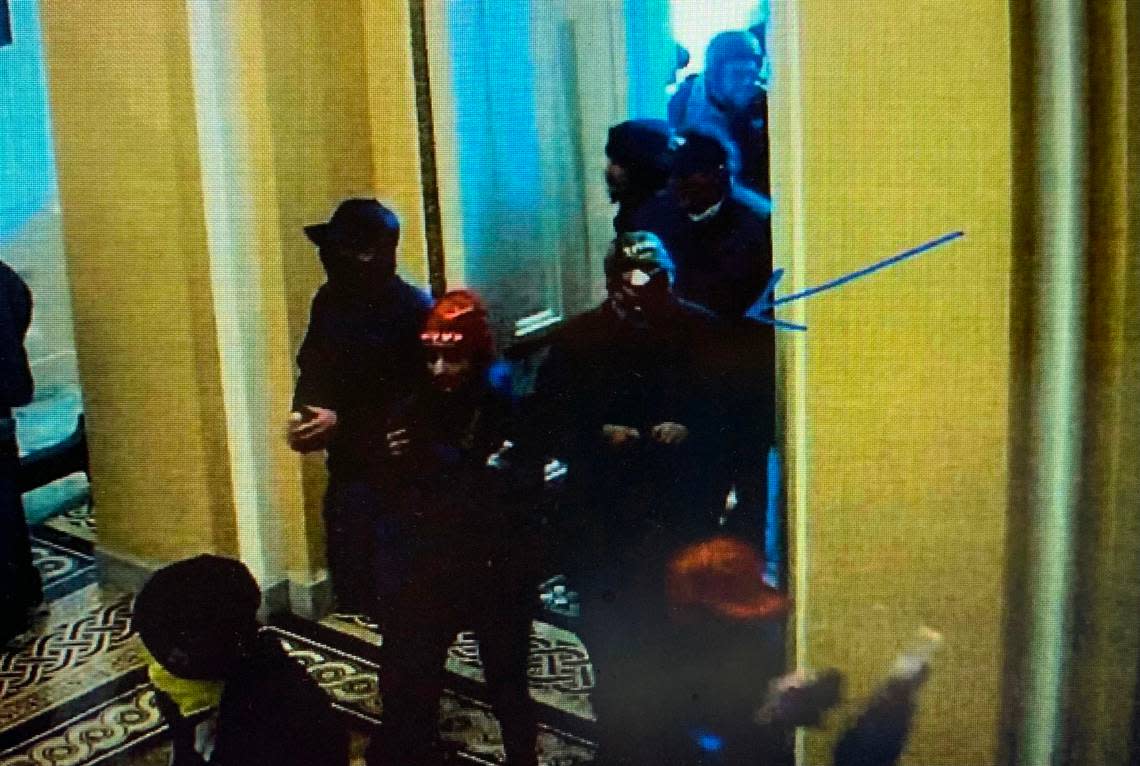Northwest Missouri man found guilty on two charges related to Jan. 6 insurrection
A federal judge on Friday found a northwest Missouri man guilty of two misdemeanor charges for his participation in the Jan. 6, 2021, insurrection at the U.S. Capitol.
Judge Reggie B. Walton, of the U.S. District Court for the District of Columbia, found Lloyd Casimiro Cruz Jr., 40, of Polo, guilty on one charge of entering or remaining in a restricted building or grounds and one charge of parading, demonstrating, or picketing in a Capitol building. His ruling came after Cruz agreed to a “stipulated trial,” meaning he waived his right to a trial in front of a jury.
Instead, his attorneys and the government agreed on a six-page document setting out the facts of the case, including that Cruz entered the Capitol building through the Senate wing door, walked to the crypt and remained in the building for a total of six minutes.
The verdict came quickly after Walton denied a motion to suppress cellphone evidence collected by the government that showed Cruz was in the Capitol during the Jan. 6 attack. The defense attorneys argued that the government had violated the Fourth Amendment to the Constitution in collecting the evidence, but Walton was dismissive of the claims, saying they had probable cause to collect the data.
“He put himself voluntarily at a location where crimes were being committed,” Walton said.
Cruz was the first of the 23 Missourians charged in connection with the Capitol riot to go to trial. His sentencing will take place on May 2. Roger Roots, one of Cruz’s attorneys, said they plan to appeal the judge’s denial of motion to suppress evidence and on the picketing charge because there was no evidence that Cruz yelled, chanted or held a sign.
Roots said he had never participated in a stipulated trial before — he asked the judge if he was allowed to make a closing argument after they had already agreed to the terms, Walton said no — and that Cruz probably would have been convicted of unlawful entry.
“I will say this could potentially be a very important Fourth Amendment case because this was one of the most broad set of search warrants in history,” Roots said.
Walton said whether Cruz held a sign was irrelevant, because the evidence said he came to Washington with the intent of participating in the “Stop the Steal” rally and to protest the certification of the 2020 presidential election. The certification was delayed after the mob stormed the Capitol and didn’t become official until around 3:44 the next morning.
“He was coming for the purpose of trying to oppose the certification of the election,” Walton said.
Of the Missourians who have faced charges related to the Jan. 6 insurrection, 16 have pleaded guilty. None of the 14 that have been sentenced have received more than 45 days in prison. Under the sentencing guidelines, Cruz would face no more than six months in prison, but a Washington Post analysis recently found that most of the people found guilty of charges related to the riot have gotten sentences below recommendations from prosecutors.
Cruz drove with friends from Missouri to Washington to attend a rally where former President Donald Trump spoke to his supporters and said he would never concede the election. Cruz then walked from the rally to the Capitol, where he saw people fighting with Capitol Police officers and breaking windows, according to the facts agreed to by his attorneys and the government.
When he was first interviewed, Cruz originally denied entering the Capitol, according to prosecutors. He later told the FBI that after he reviewed photos and video footage he took that day he remembered going inside the building.
Cruz’s attorneys were adamant that he maintained his innocence leading up to the trial, but their argument hinged largely on whether the judge would grant their motion to suppress cellphone evidence that showed Cruz was in the Capitol on Jan. 6, 2021.
Roots argued that the search warrant was overly broad because it collected cellphone numbers of everyone who was in the Capitol building that day. He argued that the case should be dismissed because he believed the search warrant violated the Fourth Amendment, which protects people against unreasonable searches and seizures of property.
Walton, however, was skeptical of the argument. He said the government only looked at the cellphone location data for a specific, public location, giving law enforcement probable cause for obtaining the records.
“He put himself in a public forum where a crime was being committed,” Walton said, challenging the idea that Cruz had a reasonable expectation of privacy.
After Walton denied the motion to suppress the evidence, Cruz’s attorneys pulled him aside to see if he would accept a plea deal, rather than face a trial in front of the jury. Instead, the two parties agreed to the stipulated trial and the judge ruled within minutes of the government presenting the agreed-upon facts of the case.
Cruz is represented by John Pierce, who at one point represented more Capitol riot defendants than any other attorney. He left the courtroom during the trial to attend another hearing in the building.
During the trial, the case was mostly handled by Roots, who is a frequent Libertarian candidate for office in Montana. He previously assisted in defending Stewart Rhodes, the founder of the Oath Keepers, a self-described militia whose members are accused of planning an armed attack on the Capitol.


